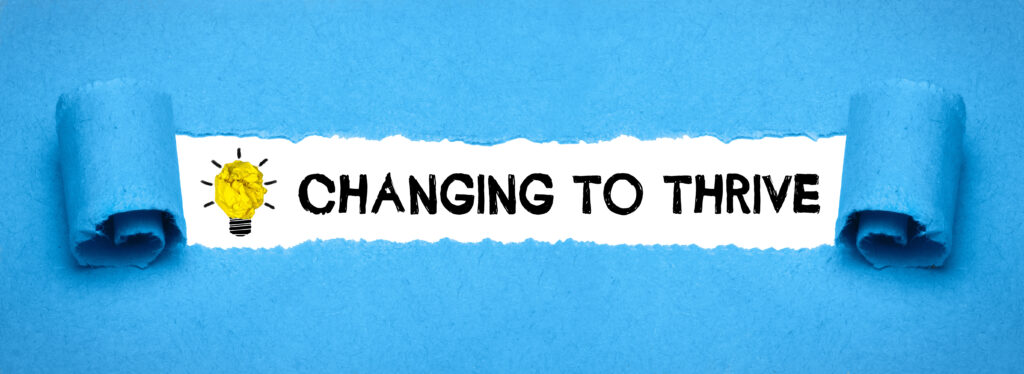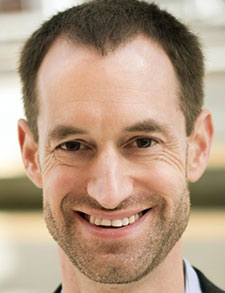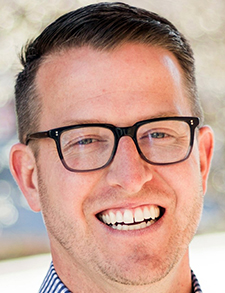Experts Offer Tips to Thrive, Not Just Survive, in Hospital Medicine
 When it comes to job satisfaction, many hospitalists might find themselves in a kind of in-between posture: Their jobs are, well, mostly fine.
When it comes to job satisfaction, many hospitalists might find themselves in a kind of in-between posture: Their jobs are, well, mostly fine.

Dr. Pierce
But Read Pierce, MD, chief of hospital medicine at Dell Medical School at the University of Texas, Austin, and Patrick Kneeland, MD, SFHM, vice president of medical affairs at Dispatch Health in Denver, Colo., say they should aspire to more.
Rather than saying, “I’m okay, but I don’t necessarily love my job,” Dr. Pierce told an audience at SHM Converge 2023, they could be saying, “I actually really like what I do.”
“That is still possible, though it may not feel like it,” he added.
In a session focused on “thriving” and not just “surviving,” the pair of physicians discussed the ways organization leaders can adapt the way they interact with their employees and target the things that research has shown really matter for people to enjoy—rather than just put up with—their jobs.
There are three main parts to burnout, research since the 1980s has shown. One is emotional exhaustion. A second is depersonalization, in which clinicians want to put distance between themselves and another person because “I can’t bear the extra ‘emotional residue burden’” of engaging in personal interaction. So physicians might label patients as a category—for instance, as a diagnosis like “a pneumonia admission”—rather than thinking of them as human beings. The third is feeling a lack of personal accomplishment, or people “feeling like they’re not doing anything they had hoped for when they signed up for this job.”
Since then, research has shown that peoples’ personal experiences—“how I feel as a human in my daily work,” Dr. Pierce said—are a big factor in job satisfaction, and this is shaped by the work culture and the work system.
More recently, over the past 10 years, researchers have found that when people are burned out, the parts of the brain that experience positive emotions—such as hope, gratitude, and pride—just don’t light up as much, he said.
Dr. Kneeland acknowledged that the idea of “culture” can seem nebulous, but ultimately it is nothing more than “how we behave with each other over time.”

Dr. Kneeland
He referred to a study of high-performing teams at Google, an effort by the company to establish what made a team perform well. They found that in these teams, everybody felt they had a voice, or what they called “equality in distribution of conversational turn-taking.” They also found that the members of these teams had high “average social sensitivity”—in other words, they were good at intuiting how others felt based on their tone of voice, their facial expressions, and other non-verbal cues.
And the primary shared attribute of leaders on these highest-functioning teams was vulnerability—they were, Dr. Kneeland said, willing to “be human in front of their teams.” This, in turn, he said, promotes a feeling of psychological safety to embolden team members to take risks that enhance collective learning.
He discussed behaviors that have a “high ROI” when it comes to promoting a feeling of well-being and psychological safety.
One is asking “powerful questions,” those that are open-ended, that are non-judgmental, that have an unknown answer, and that are exploratory. During an annual review, for example, a question might be: What is energizing you in your current work?
Asking powerful, open-ended questions can have real effects. A study found that leaders who used powerful questions that elicited positive information—such as, “What are two to three things that are going well, and one thing we need to do better?”—helped improve readiness and a climate of teamwork, lower feelings of burnout, and even improve the perception of work-life balance, Dr. Kneeland said.
That, he said, is “an interesting breadth of impact from a single behavior change that’s actually pretty simple.”
Another behavior, which follows asking an open-ended question, is reflecting back to the speaker what they’ve said, Dr. Pierce said.
“Before I do anything else… I’m going to summarize briefly what did I hear from the person,” he said. “Simply letting people feel heard turns out to have a really, really powerful impact both on culture and on a whole host of things, such as skepticism, burnout, and physical symptoms, that we’re seeing in biomedical science.”
A study of lower back pain interventions split people into the standard-of-care physical therapy group and into a group in which the clinician did active listening, reflecting back to patients what they’d said, such as “Gosh, that sounds really hard for you.” Those in the listening group had better outcomes, Dr. Pierce said.
“Listening is not a passive thing we’re doing to fill airtime,” he said. “It’s an active leadership intervention. It is a form of culture building.”
When leaders “check in” with people, they often might not be doing so in a meaningful way, he said. “’How are you doing today?’ ‘Good,’” won’t have much of an effect, he said.
“If I really do check in, I’m a little nervous that I’m going to open up a space where somebody gives me a bunch of negative information,” he said, and there will be pressure to respond. But leaders don’t necessarily need to have this apprehension, he said. The response to someone reporting communication problems during a night shift could be, “Gosh, I think I hear you saying that was a really tough week and the communication with other services is difficult for you, and that’s really left you wondering how many more nights you want to do, is that right?”
Responding with empathy sounds simple but is actually difficult because people are hard-wired to become defensive or respond quickly to a complaint with technical fixes or data. Good leaders, he said, first concern themselves with “just legitimizing that what the other person is experiencing is normal.”
“You’re just saying, that’s a normal human reaction.”
Tom Collins is a medical writer in South Florida, who has written about everything from lethal infections to thorny ethical dilemmas, runaway tumors to tornado-chasing doctors. He gathers health news from around the globe and lives in West Palm Beach.